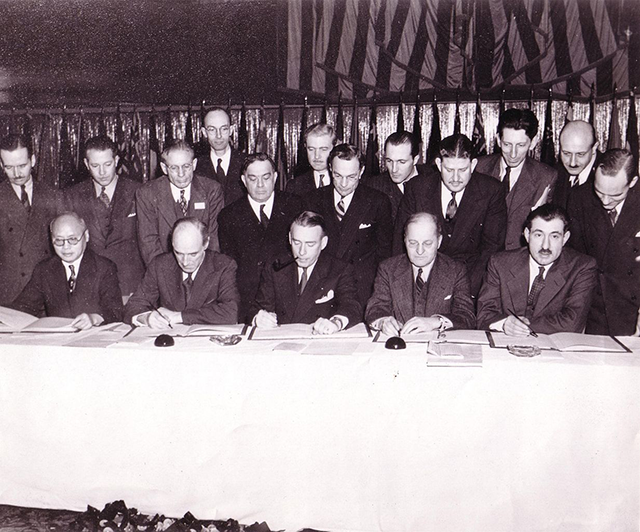Cabotage is simply the legal way of saying transporting people and things within a country. If that country is not your own, you may need permission to do that. The penalty for making a mistake here can be severe, so you need to be smart about the subject if you plan on making multiple stops in a country with people and things you didn't bring with you in the first place.
— James Albright

Updated:
2020-12-28
The Chicago Convention gives each country the right to prohibit cabotage, but not all countries do this. The United States does, I've included the laws to illustrate this. As you travel abroad, if you intend to pick up foreign nationals or cargo and drop them someplace else in the country, you need to make sure cabotage in that country is permitted. There are exemptions in some countries if the people you are carrying are a part of your business. You need to research this to be sure.

1
Defined
Generally speaking, you cannot fly to some foreign countries, pick up local citizens and transport them within that country. Not all countries have cabotage restrictions and many that do will allow exceptions if the citizens are employees of a company associated with the airplane. The rules vary by country and you need to ensure you follow them.
So what is this convention we hear so much about? During World War II it became obvious that having a bunch of airplanes from different countries share the same airspace wouldn't work if they all used the operating rules and standards from their home countries. The powers that be met in Chicago and agreed upon a set of rules that became known as the Convention on International Civil Aviation Done at Chicago on the 7th Day of December 1944.
Each contracting state shall have the right to refuse permission to the aircraft or other contracting States to take on in its territory passengers, mail and cargo carried for remuneration or hire and destined for another point within its territory. Each contracting State undertakes not to enter into any arrangements which specifically grant any such privilege on an exclusive basis to any other State or airline of any other State, and not to obtain any such exclusive privilege from any other State.
Source: ICAO Chicago Convention Article 7
The State Pages of your Jeppesen manuals do mention cabotage in a few places but the coverage isn't complete. The next step is to the particular country's International Flight Information Manual (IFIM), but those aren't easy to come by. I've found the best course of action is to use an international handler, like Air Routing or Universal, with boots on the ground in country. Tell them what you plan to do and ask "is it legal? and "will the local authorities object?"
You might be tempted to blow the entire topic off, thinking you are not operating for remuneration or hire. Think again, many countries have expanded the definition to include just about any business purpose.
Thankfully, many countries consider an employee of a multinational a part of a U.S. branch of the same company. I've done this as a pilot for Compaq Computer, for example: flown German nationals employed by Compaq in Germany within points in Germany. We asked the local authorities first who did not object. Ask first!
2
U.S. law
(a) The air cabotage law (49 U.S.C. 41703) prohibits the transportation of persons, property, or mail for compensation or hire between points of the U.S. in a foreign civil aircraft. The term “foreign civil aircraft” includes all aircraft that are not of U.S. registration except those foreign-registered aircraft leased or chartered to a U.S. air carrier and operated under the authority of regulations issued by the Department of Transportation, as provided for in 14 CFR 121.153, and those aircraft used exclusively in the service of any government.
(b) Customs officers detecting possible violations shall report the matter to Headquarters, Attention: Entry Procedures and Carriers Branch. Liability should not be assessed under 49 U.S.C. Chapter 463 pending instructions from Headquarters since certain limited domestic transportation by foreign civil aircraft is permitted under regulations issued by the Department of Transportation.
Source: 19 CFR, §122.165
Navigation of foreign civil aircraft
(a) Permitted Navigation.—A foreign aircraft, not part of the armed forces of a foreign country, may be navigated in the United States only—
(1) if the country of registry grants a similar privilege to aircraft of the United States;
(2) by an airman holding a certificate or license issued or made valid by the United States Government or the country of registry;
(3) if the Secretary of Transportation authorizes the navigation; and
(4) if the navigation is consistent with terms the Secretary may prescribe.
(b) Requirements for Authorizing Navigation.—The Secretary may authorize navigation under this section only if the Secretary decides the authorization is—
(1) in the public interest; and
(2) consistent with any agreement between the Government and the government of a foreign country.
(c) Providing Air Commerce.—The Secretary may authorize an aircraft permitted to navigate in the United States under this section to provide air commerce in the United States. However, the aircraft may take on for compensation, at a place in the United States, passengers or cargo destined for another place in the United States only if—
(1) specifically authorized under section 40109(g) of this title; or
(2) under regulations the Secretary prescribes authorizing air carriers to provide otherwise authorized air transportation with foreign registered aircraft under lease or charter to them without crew.
(d) Permit Requirements Not Affected.—This section does not affect section 41301 or 41302 of this title. However, a foreign air carrier holding a permit under section 41302 does not need to obtain additional authorization under this section for an operation authorized by the permit.
(e) Cargo in Alaska.—
(1) In general.—For the purposes of subsection (c), eligible cargo taken on or off any aircraft at a place in Alaska in the course of transportation of that cargo by any combination of 2 or more air carriers or foreign air carriers in either direction between a place in the United States and a place outside the United States shall not
(2) Eligible cargo.—For purposes of paragraph (1), the term “eligible cargo” means cargo transported between Alaska and any other place in the United States on a foreign air carrier (having been transported from, or thereafter being transported to, a place outside the United States on a different air carrier or foreign air carrier) that is carried—
(A) under the code of a United States air carrier providing air transportation to Alaska;
(B) on an air carrier way bill of an air carrier providing air transportation to Alaska;
(C) under a term arrangement or block space agreement with an air carrier; or
(D) under the code of a United States air carrier for purposes of transportation within the United States.
Source: Title 49, §41703
Emergency Air Transportation by Foreign Air Carriers.—
(1) To the extent that the Secretary decides an exemption is in the public interest, the Secretary may exempt by order a foreign air carrier from the requirements and limitations of this part for not more than 30 days to allow the foreign air carrier to carry passengers or cargo in interstate air transportation in certain markets if the Secretary finds that—
(A) because of an emergency created by unusual circumstances not arising in the normal course of business, air carriers holding certificates under section 41102 of this title cannot accommodate traffic in those markets;
(B) all possible efforts have been made to accommodate the traffic by using the resources of the air carriers, including the use of—
(i) foreign aircraft, or sections of foreign aircraft, under lease or charter to the air carriers; and
(ii) the air carriers’ reservations systems to the extent practicable;
(C) the exemption is necessary to avoid unreasonable hardship for the traffic in the markets that cannot be accommodated by the air carriers; and
(D) granting the exemption will not result in an unreasonable advantage to any party in a labor dispute where the inability to accommodate traffic in a market is a result of the dispute.
Source: Title 49, §40109(g)
References
(Source material)
19 CFR, U.S. Customs and Border Protection, Department of Homeland Security, Department of Treasury
Title 49, Transportation, Office of the Secretary, Department of Transportation
Convention on International Civil Aviation Done at Chicago on the 7th Day of December 1944
